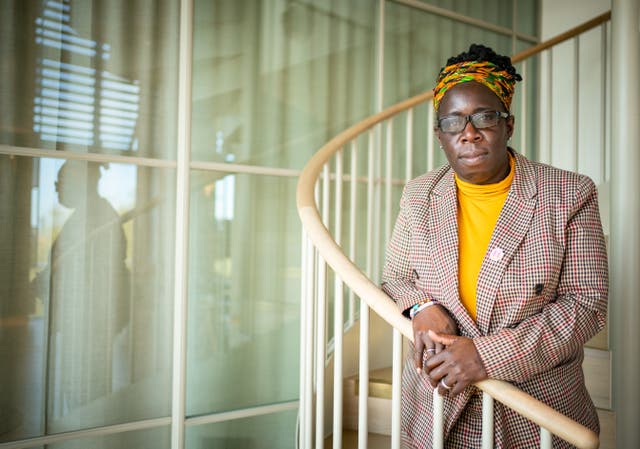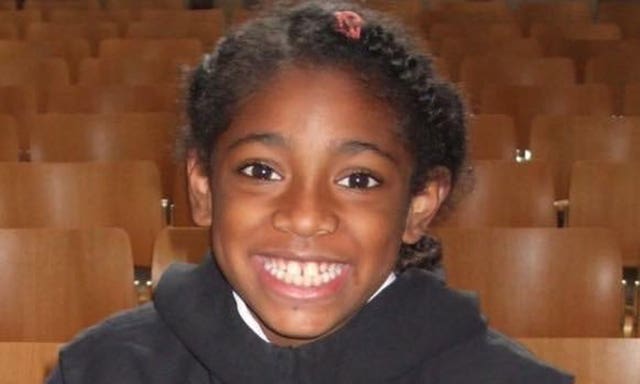Ella Adoo-Kissi-Debrah: Air pollution targets an ‘insult’ to daughter’s memory
Rosamund Adoo-Kissi-Debrah, whose nine-year-old daughter Ella suffered a fatal asthma attack in 2013, spoke at a conference in central London.

A mother whose nine-year-old daughter died due to dangerous levels of air pollution has described the Government’s climate targets as an “insult” to her memory.
Rosamund Adoo-Kissi-Debrah, whose nine-year-old daughter Ella suffered a fatal asthma attack in 2013, spoke on an air pollution conference panel in Borough, central London, along with three experts on Wednesday.
The conference marked one year since Coroner Philip Barlow urged the Government to set legal air pollution limits based on 2021 World Health Organisation (WHO) guidelines and to launch a public awareness campaign in response to the school child’s death.
The Government is currently working towards meeting the WHO’s older 2005 guidelines by 2040.
Ms Adoo-Kissi-Debrah told the panel: “It really is a bit of an insult to Ella’s memory when I think about it.
“What they are telling the British public is: ‘We will meet the 2005 target by 2040’.
“I try not to get emotional about it, but my concern is that it’s not going to change life for an asthmatic child who lives by a busy road and who is breathing toxic air.”

Ella was the first person in the UK to have air pollution listed as a cause of death.
Following the conference, Ms Adoo-Kissi-Debrah told the PA news agency she was concerned more children would suffer, particularly those from poorer families, as a result of the Government’s inaction.
When asked how it felt that so little had changed since her daughter’s death, she said: “As her mum it’s always going to be quite gut-wrenching because your child is always really personal to you and you want so much to be done.
“Also, after Covid, I start thinking about things like Long Covid and a number of children have got it, and the fact that there is no cure – very similar to asthma.
“I know that it would have really changed some young people’s lives.
“Poorer people will probably end up getting Covid even worse.
“With children, their lungs aren’t fully formed.
“Breathing in polluted air all the time, then imagine getting Covid on top – it’s not a good picture.”
“And really, nobody should die from asthma in 2022,” she added.
“You need to try and imagine that this time next year, in London between eight and 12 children would have died from asthma.
“When you put it in that context, it shows you the seriousness of the situation.”

The campaigner was joined at the conference by Hodge Jones & Allen solicitor Guy Mitchell, special adviser to the Royal College of Physicians on air quality Professor Stephen Holgate, and Battcock Chair in Community Health and Policy at Imperial College London, Professor Frank Kelly.
Mr Mitchell said the Government has “failed to act” on the coroner’s recommendations and has been “kicking the can down the road repeatedly instead of taking action that could save lives”.
Prof Kelly said Imperial College research shows that the WHO target for emissions could be met by 2030, at a cost of £3.5 billion per year – but it would save £50 billion in health costs.
He also praised the proposed ultra-low emission zone in London led by Mayor Sadiq Khan as a “world leading policy”.
The Environment Department (Defra) said that national air pollution levels have been reduced “significantly” since 2010, but conceded there is still “a vital need for action”.
A Defra spokesman said: “Ella’s death was a tragedy, and the tireless campaigning of her family and friends reinforces the vital need for action.
“Air pollution at a national level continues to reduce significantly, with nitrogen oxide levels down by 44% and PM2.5 down 18% since 2010, but we know there is more to do.
“Our cross-Government efforts will drive forward tangible and long-lasting changes to improve the air we breathe, including setting stretching and ambitious targets on air quality through our Environment Act.”
In March this year, Defra set out a series of proposed legally binding long-term green targets as part of the post-Brexit Environment Act to protect England’s air, water, resources and nature.
This includes targets to curb annual average levels of fine particulate matter at PM2.5 to 10 micrograms per cubic metre across England by 2040 – double the World Health Organisation’s new guideline limits – and to reduce exposure to the dangerous pollutant by a more than a third compared with 2018 levels.





